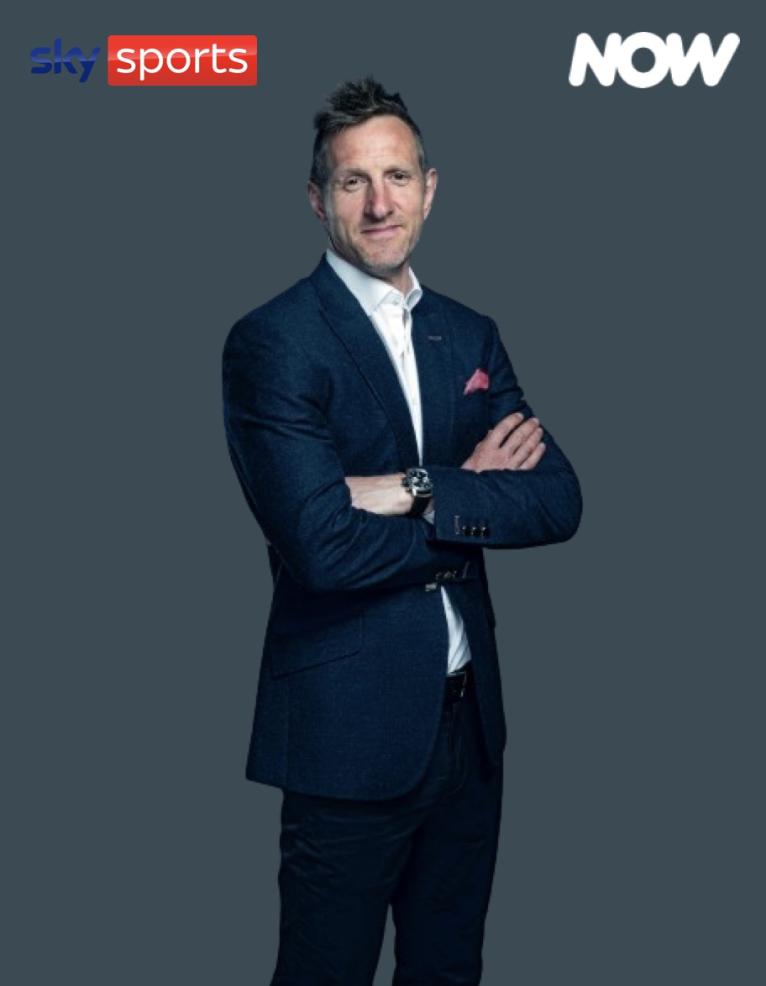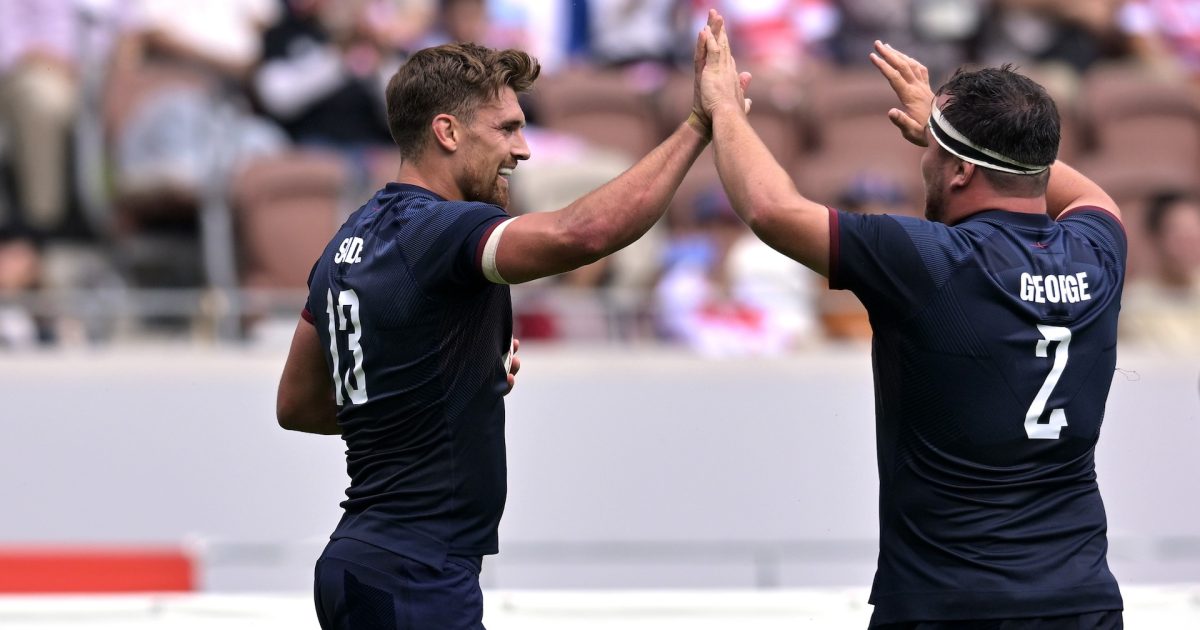Greenwood discusses Slade's comeback and the recipe for RWC success

The past twelve months have been as tumultuous as they come professionally for England centre Henry Slade.
After suffering the heart-wrenching despair of missing out on the World Cup squad in August 2023, he returned to an Exeter Chiefs side that had seen the heart of its squad ripped out over the summer.
Friends and teammates that the 31-year-old would have spent most, if not all, of his career alongside and enjoyed so much success with were gone. Jack Nowell, Luke Cowan-Dickie, Sam Simmonds had all moved on, to name a few, leaving Slade the elder statesman at Sandy Park.
Few would have blamed him if he decided to pursue options abroad, but instead, he worked his way back into Steve Borthwick’s squad for the Six Nations, signed a new deal with the Chiefs and was crowned the Gallagher Premiership player of the season. Not a bad way to finish a season that must have started so miserably.
But Slade’s predecessor in the England No.13 jersey, World Cup winner Will Greenwood, believes the disappointment of failing to make the cut to go to France last year forced him to reach levels he may not have reached if he were selected.
Greenwood likened it to the disappointment an Anglo-heavy British & Irish Lions squad felt losing to Australia in 2001, and how his father, former England player and coach Dick Greenwood, believes England would not have won the World Cup two years later had the Lions triumphed over the Wallabies. The heartbreak is part of a process, and makes players better in the grand scheme of things.
Slade is in line to start his eighth England match on the bounce against the All Blacks on Saturday at Eden Park. In fact, he has started every match in white since their World Cup campaign last year. While he may not have appreciated it at the time, Greenwood thinks his fellow centre may one day look back on the past year as a seminal stage in his career.
“To come back from the disappointment of missing out on a World Cup,” said Greenwood, speaking on behalf of NOW, “to make the decision to stay at Exeter and to fight and scrap for his England Jersey, I know he’d rather have done it a different way, but I think he might find himself going to places he would never have reached if he’d just been picked and picked and picked.
“It’s why I believe at junior level you should drop kids. That sounds mean, but they’ve got to get used to it. If you’re in the A team every week and the first time you get dropped you’re 19, you don’t know how you’re going to react, and by the way, if you react badly you give up the game. That’s what can happen.
“He’s gone back to Exeter and it’s a kids team this year, they’ve made so many changes. So many young lads, and he’s had to live with the disappointment and he’s had to lead. I think he’ll always regret not going, but I think he might have the ability to look back on it with time and go ‘Maybe that made me the player that I became.’
“You go through tough times in your career, and you find me someone at the top of any sport who hasn’t been through s**t, personally or professionally, I think you’ll find someone who probably gives up at 20 and doesn’t make it. It’s just part of getting to the top.”
Slade’s return to the England set-up also coincided with Felix Jones’ arrival as defence coach.
The Irishman has brought a defensive system from his time with the Springboks that puts the outside backs under immense duress both physically and mentally.
As a former centre, the complexity and difficulty in defending in the No.13 channel is not lost on Greenwood, and he has praised Slade in being able to mix with the best when it comes to his defensive contribution.
“I’ve always thought, because wingers and fullbacks dropped – especially with the 50-22, but even in the olden days – I’ve always thought the centres are the hardest position to defend in the world,” the 55-cap England international said.
“Because you’ve got heavy trucks off five-man lineouts coming down your channel and the next thing they’re going out the back and they’re sending Cheslin Kolbe on a wide arc and you’ve got to try and gun him down.
“In that position, I think Rieko [Ioane] is an outstanding defender. There are so many. [Jesse] Kriel’s ability to come hard at you, even if he gets done, he’ll turn and he’ll gun you down. I think there are some really top-class operators outside centre- Ringrose is right up there when he’s fully fit. It’s tough and Henry’s doing a great job that could compare to anyone at the highest level.”
That praise can also be directed towards England’s inside centre Ollie Lawrence, who is building a strong relationship with Slade in the midfield.
One of England’s shortcomings of the last World Cup cycle under Eddie Jones, and to a lesser extent under Borthwick, was the inability to settle on a centre partnership.
Almost every great team in recent history has had a recognisable, and indeed iconic, centre pairing. Borthwick is acutely aware of that, and by partnering Lawrence and Slade for the sixth Test in a row he has set out his stool that this will be the England partnership moving forward perhaps even to the World Cup in 2027.
Greenwood himself knows that all too well, with Mike Tindall being his midfield partner in crime for the Red Rose as they lifted the Webb Ellis Cup 21 years ago.

“I think those relationships are critical,” Greenwood added.
“I don’t think the centre is any different to the back row unit. I think with all of those, you’ll see that in the scrum or the lineout, it just takes time together.
“You might have a couple of hit-outs early on where it clicks. But at some stage, real relationships, it’s like this on and off the field, real relationships get tested, and how you cope under pressure and how you react as a partnership on the pitch, off the pitch, defines whether you will function well at the top level.”
It is not just the midfield pairing that are benefitting from this consistency in selection, as Borthwick has only made one change to his squad for the second Test against the All Blacks from the one that lost 16-15 in the first Test, and that was a forced replacement.
While a squad of 40 players needs to ideally be built to win a World Cup, according to Greenwood, the only way victories on New Zealand soil will come is through consistency of selection.
Borthwick can learn from Greenwood’s England team of 2003, as twelve players who started in their last win against the All Blacks in New Zealand started in the World Cup final later that year.
“I think Steve’s been really good over the course of this tour,” the former Harlequins and Leicester Tigers centre said. “When you think about [Ben] Spencer, [Tom] Roebuck, [Ollie] Sleightholme coming in, getting some minutes, the Test match atmosphere.
“There’s a time where you have to build a squad of 30, in the reality you probably need a squad 40 to win a World Cup. You need to be able to cut, copy and paste. We used to call it moving up the squash ladder.
“I think you need three in every position by the time you come to a World Cup, because you can be pretty damn sure that one of them’s going to get crocked and then the other you need to be able to just interchange at any stage, have a style of playing, and before you know you’re away and running. So he’s done that.
“He gave some game time in Japan, so they haven’t really been just bag holders for three weeks. But at a certain stage, winning a two Test series in New Zealand, or at least now coming out of it level, is such a rare thing to do.”
Stream the second New Zealand vs England’s summer rugby international live on Sky Sports with a NOW Sports Day or Month Membership.





















